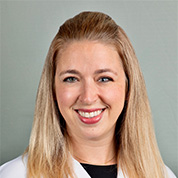Q: To what do you attribute Comer Children’s Hospital’s groundbreaking work in pediatric cancer?
Dr. Schwartz: We have cancer researchers working at the molecular level, mapping out pathways of proteins that trigger disease, as well as those, like myself, who are focusing on macro-level issues like socioeconomic factors and how early childhood adversity affects disease states in children. We work in a highly collaborative environment, and I think this spirit of collegiality creates a continuum that can push and advance pediatric cancer treatments and research.
Q: Can you describe the RFP process for the RBC Race for the Kids at Comer Children’s Grant?
Dr. Schwartz: I applied for the grant with the project summary, formal research proposal, personal statement, my CV, project budget, and an endorsement from my mentor, Tara Henderson, MD, the Pediatric Hematology/Oncology Section Chief. Within a week, I was notified by the Comer Children’s Development Board that the project was selected as a finalist for funding consideration. In January 2022, I presented details about the research project to the Board, and two days later, I was notified that we received the grant. It was such an exciting moment for me!
“We’re conducting difficult, but necessary conversations about childhood abuse, neglect, and household dysfunction to find out where our survivors are coming from and how we can support them, not just psychologically, but also from a disease prevention standpoint down the road.”- Dr. Lindsay Schwartz, Clinical Instructor in Pediatrics at University of Chicago Medicine Comer Children’s Hospital.
Q: Can you describe the goals of the research project?
Dr. Schwartz: We know from previous research that cardiovascular disease is the number one non-cancer related cause of death for childhood cancer survivors, and compared to the average person, survivors have an increased risk of premature mortality, partly due to cardiovascular disease. On the other hand, we’ve also looked at Adverse Childhood Experiences (ACEs), which are traumatic childhood events that occur before someone turns 18 years old. Research on ACEs in the general population hasalso shown that those with ACEs have an increased risk of cardiovascular disease and premature mortality.
I was interested in exploring a potential overlap, so we collaborated with the Childhood Cancer Survivor Study (CCSS). We’re conducting a case-control study to investigate the relationship between ACEs and cardiovascular disease in childhood cancer survivors.
On a more positive note, we also want to see if resilience, defined as a person’s ability to harness resources to maintain their well-being during adversity, affects the relationship between ACEs and cardiovascular disease.
“The results of this project could provide a foundation for services, intervention, and programming that could improve health outcomes for pediatric cancer survivors who were hit with a double whammy of both a cancer diagnosis and adverse childhood experiences before their 18th birthday.”- Dr. Lindsay Schwartz, Clinical Instructor in Pediatrics at University of Chicago Medicine Comer Children’s Hospital.
Q: What type of outcomes do you hope to achieve with this research?
Dr. Schwartz: I think this research is important because resilience isn’t taught, it’s a learned trait. If we find a positive effect, it might help prevent poor outcomes in childhood cancer survivors with ACEs in the future. Because of the sensitive nature of childhood trauma, CCSS never asked its cohort these types of questions before this study. Now, there’s a strong desire to get this right.
Q: How will this research impact pediatric cancer treatment in the future?
Dr. Schwartz: When children beat cancer, it’s my job as a survivorship clinician to ensure something else, like cardiovascular disease, doesn’t interfere with their ability to lead long and healthy lives. The results of this project could provide a foundation for services, intervention, and programming that could improve health outcomes for pediatric cancer survivors who were hit with a “double whammy” of a cancer diagnosis and ACEs before their 18th birthday.
Q: With their financial support, how are RBC employees making a difference in the lives of children with cancer?
Dr. Schwartz: Everyone is familiar with stories about children who beat cancer, but that’s not the whole story. We often forget that childhood cancer survivors remain vulnerable for years, even decades after they beat cancer. For example, they are diagnosed with cardiovascular disease at seven times the rate of the average person.
We can’t change most of the treatments needed to survive. So, we look at things we can change, and that’s where this research comes in. We’re conducting difficult, but necessary, conversations about childhood abuse, neglect, and household dysfunction to find out where our survivors are coming from and how we can support them not just psychologically, but also from a disease prevention standpoint down the road.
Q: In light of World Mental Health Day this month, can you share the importance of your work?
Dr. Schwartz: The pandemic shed light on the importance of mental health, and I believe these issues are becoming de-stigmatized. ACEs are not only very stigmatizing, but they are also often kept secret. In my conversations about ACEs with potential study participants, I often hear, “No one ever asked me this before,” or, “I never thought that could be affecting my health.” We found that participants want to talk about these issues, and as clinicians and researchers, we need to ask them the hard questions. Sometimes that’s the first step in the healing process.
